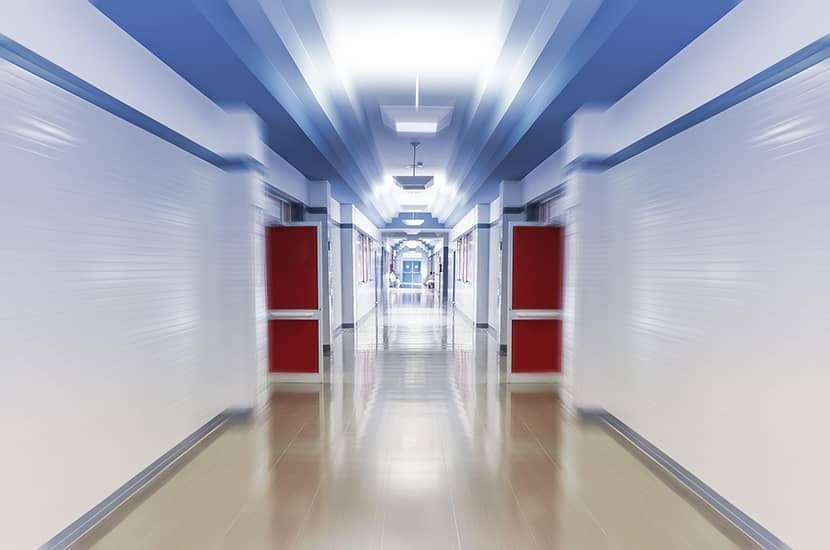At the desk I gave my name and showed my Covid vaccination pass and the woman told me to take a seat with the others. I greeted the two elderly couples and the healthy-looking man wearing a three-piece suit and tie and plonked myself down on one of the orange sofas.
The tatty oncology department at Marseille now feels like home. The hard-as-nails but sympathetic receptionists. The seatless lavatory bowl. The notice on the wall listing the recognised mainstream religions, designating them with equal disdain as ‘cultes’. Which is a far cry from Torbay hospital, where I was treated for cancer before this. At Torbay hospital the oncology department has a solid Anglican chapel right next door and back then I would pop in before appointments and get on my knees and pray.
I’d pray, I’m afraid, in the spirit of a boulevardier offering a penny to a blind fiddler. ‘Thanks for everything,’ I’d say. ‘It’s been marvellous. Sorry I’ve been such a twat.’
The white rocks and sharp sunlight put my cancer in a holiday mood and it became expansive
Credit where credit’s due, the boulevardier never asked to be spared, however. Unbecoming. Especially in a sixty-something-year-old.
But back then my cancer was just a word. A word with no consequences. And even though from my oncologist’s point of view the cancer was quite real — she had photographs to prove it — it did seem to be very easily intimidated. Brandish a stick at it and it would shrink back to its lair and go quiet for months. Those were the days.
Then my cancer and I moved from a soft red Devon to hard, dry Provence. (I have been here continuously since Covid.) France must have suited it. The white rocks and sharp sunlight put it in a holiday mood and it became expansive. Now they tell me that it is not only very real but it has also taken over the shop and become ‘aggressive’. Viewed in retrospect, Devon was life and health and Provence has turned into a dazzling purgatory. Perhaps for my third act, for the sake of symmetry, I ought to consider moving somewhere completely inhospitable — to a tent in the Sinai desert, for example.
Such (and others besides) were my gloomy, inchoate thoughts as I crossed my thinning legs on the orange sofa in the waiting room of the oncology department at Marseille.
The purpose of this appointment was for the oncologist to unveil the results of a CT scan. I was two thirds through a six-month course of chemotherapy and we could then discuss whether I felt able or willing to complete the course or whether I wanted to call it a day.
If the scan results showed conclusively that the chemotherapy was having little or no effect on the progress of the tumours there was little point in carrying on. Blood tests showed that after decreasing initially, the prostate-specific antigen marker was rising again. PSA scores are notoriously inaccurate, however. The scan results would therefore reveal the full starting prices.
Outside, my taxi was waiting. The driver had asked before we had set off what was the purpose of today’s visit. (He needed the information to complete one of his forms.) ‘Consultation,’ I’d said. ‘Death sentence actually. Put that on your form.’ His reply to that was a torrent of vitriol, the gist of which was: ‘Pull yourself together, man!’ Because this was likely to be my last hospital visit before Christmas, I passed him a bottle of champagne.
In the rucksack at my feet was a second bottle ready to give the oncologist. As I felt inside my rucksack to make sure it was still there, I heard my name called. I looked up to see the oncologist standing in the corridor, this courtly man ready to show me to his office door and waft me in ahead of him. He is in his early forties and treats me with a level of diffidence that I have only ever seen before in the broken-hearted. I’ve sat in front of him perhaps 20 times. The top half of his face is familiar, the bottom half remains guesswork.
Long before we reached his office door he turned his face to mine. Above the mask his expression was radiant with joy. Bugger the formality of his office — this brotherly man couldn’t let another moment pass before telling me the good news. ‘The scan results are incredible,’ he said, in ecstatic falsetto, in English. But he had already said too much in a public place. He put his head down and herded me through his office door. Once inside, instead of sitting facing me across his desk as usual, he sat beside me and with a trembling hand highlighted in yellow pen the crucial sentences of the scan report. Every tumour except one had shrunk or disappeared. No longer an oncologist but merely an astounded friend, he just sat there shaking his head. Something I shall never forget.
This article is free to read
To unlock more articles, subscribe to get 3 months of unlimited access for just $5








Comments
Join the debate for just £1 a month
Be part of the conversation with other Spectator readers by getting your first three months for £3.
UNLOCK ACCESS Just £1 a monthAlready a subscriber? Log in